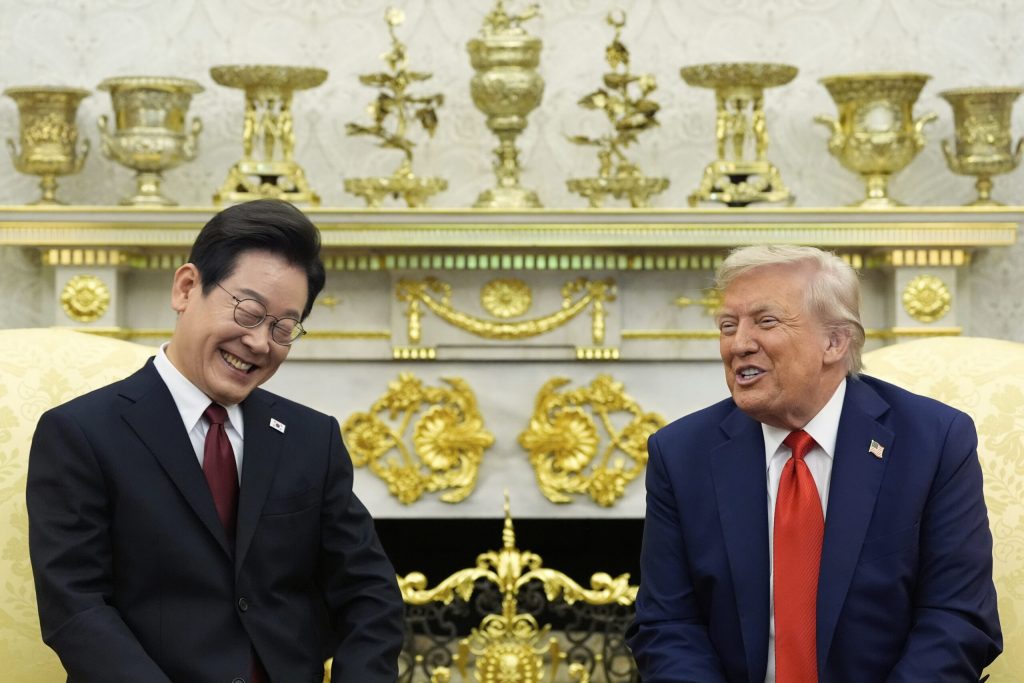Trump Expresses Willingness to Meet North Korea’s Kim, Holds Talks with South Korea’s President

President Donald Trump announced on Monday that he wants to meet with North Korean leader Kim Jong Un before the end of the year, and indicated a willingness to continue trade discussions with South Korea, even as he voiced fresh criticisms of the visiting U.S. ally.
“I’d like to meet him this year,” Trump told reporters in the Oval Office during his first meeting with South Korea’s new president, Lee Jae Myung. “I look forward to meeting with Kim Jong Un in the appropriate future.”
Despite finalising a trade agreement in July that helped protect South Korean exports from additional U.S. tariffs, the two countries remain divided on several issues — including nuclear policy, defence contributions, and the specifics of a $350 billion investment pledge from South Korea to the United States.
After his meeting with Trump, President Lee joined a business forum attended by high-level U.S. officials and top executives from both American and South Korean companies.
As part of the visit, Korean Air announced it had placed an order for 103 aircraft from Boeing — the largest purchase in the airline’s history.
North Korea did not immediately comment on Trump’s remarks. However, its state media later criticised recent joint military drills between the U.S. and South Korea, claiming they reflected an intent by Washington to “occupy” the Korean Peninsula and threaten regional stability.
Since Trump’s return to office in January, Kim Jong Un has yet to respond to repeated outreach efforts aimed at restarting direct talks — a continuation of the diplomatic approach Trump pursued during his previous term, which ultimately failed to yield an agreement on halting North Korea’s nuclear program.
During his White House visit, Lee avoided the confrontational tone that characterised earlier visits by leaders such as Ukrainian President Volodymyr Zelenskyy and South African President Cyril Ramaphosa.
Instead, Lee focused on shared interests, complimented the Oval Office decor, and praised Trump’s efforts toward peace. He told reporters he had prepared for the meeting by reading Trump’s 1987 book.
“I hope you can bring peace to the Korean Peninsula, the only divided nation in the world, so that you can meet with Kim Jong Un, build a Trump World (real-estate complex) in North Korea so that I can play golf there, and so that you can truly play a role as a world-historical peacemaker,” Lee told Trump, speaking in Korean.
According to Lee’s office, the two leaders also discussed the shipbuilding industry and separate assassination attempts that both have survived. Lee invited Trump to attend the APEC summit in October and suggested it might be a good opportunity to meet Kim Jong Un as well.
Later, during an event at the Center for Strategic and International Studies in Washington, Lee expressed concern that sanctions against North Korea have not succeeded in curbing its nuclear ambitions.
“Despite the massive sanctions imposed to deter North Korea, the result has been the continuous development of nuclear weapons and missiles,” he said.
Lee added that North Korea is believed to have the ability to produce between 10 and 20 nuclear warheads per year and is close to completing a reentry vehicle capable of delivering those warheads on long-range missiles that can reach the U.S.
Ongoing Tensions in the U.S.–South Korea Alliance
The United States remains South Korea’s key security partner, maintaining 28,500 troops on the peninsula and providing nuclear deterrence. Trump has repeatedly questioned the financial arrangement, once describing South Korea as a “money machine” benefiting from American protection.
“I think we have a deal done” on trade, Trump told reporters. “They had some problems with it, but we stuck to our guns.”
He did not provide further details, and no additional comments were released by the White House.
Trump also mentioned receiving “intel” about ongoing investigations in South Korea, suggesting they targeted religious institutions and a military base. The White House declined to elaborate further.
Earlier this month, South Korean authorities raided Sarang Jeil Church, led by a conservative pastor who had supported former president Yoon Suk Yeol. In a separate case in July, prosecutors served a search warrant at a Korean section of a military base shared with the U.S., in connection with an investigation into Yoon’s attempt to declare martial law. Officials noted that U.S. personnel and assets were not affected.
Far-right groups in South Korea — including evangelical communities and backers of Yoon — claim these actions are part of a politically driven campaign.
Trump was also expected to press Lee to increase South Korea’s defense spending, including its contribution to the upkeep of U.S. military forces stationed there.
When asked whether the number of U.S. troops might be reduced to provide greater strategic flexibility in the region, Trump said:
“I don’t want to say that now,” but added that Seoul might consider handing over control of “the land where we have the big fort,” apparently referencing Camp Humphreys, a large U.S. Army garrison.
Before the meeting, Lee acknowledged that accommodating U.S. demands for broader use of American forces — potentially for missions related to China — would be a difficult decision for Seoul.
